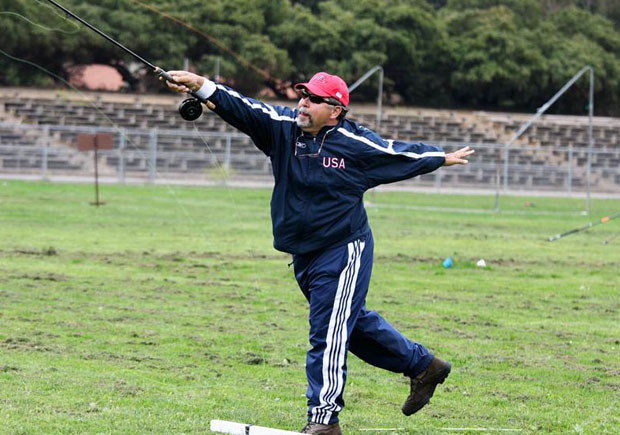[dropcap]U[/dropcap]ntil you see graphite and scrim being applied to mandrels at a “factory” and watch a fly rod go the distance in a modern-day fly plant like G Loomis, most would think the following. Super hi-tech, computerized equipment, ovens, paint lines and controlled drying rooms. Well, you’re sort-of right. Loomis, as you’ll see in the short but captivating video, has all the modern marvel stuff, but the hands-on part is still very much alive, and it looks like it will be for long time.

Steve Rajeff at the G Loomis’ sanding station at the Woodland, WA plant. Steve, aside from being the Babe Ruth of fly fishing competition, is the fly rod designer for Loomis. Loomis is part of Shimano who also owns Power Pro.
If you think a little further after seeing the video, you’ll realize that there’s considerable expense in making these hi-tech, hi-end rods. For example, there’s real estate, factory building, utilities, equipment, inventory, trade shows, grumpy dealers and dreaded taxes. There’s also administration, office staff, sales staff, technical folks, factory trades folks, and of course the folks who cheerfully fix that 8-weight that the new puppy chewed up. More amazingly, they all expect to get paid on Friday.
We’re not sure an $800 rod will cure your wrist hitch, but we’re sure you’d like that $800 5-weight.
The following is an excerpt from Jim Lepage’s How Fly Rods Are Made which appeared in MidCurrent about four years ago.
Carbon Fibers and the Main Flag and Scrim
by Jim LePage
” . . . The main flag and scrim are both composed of carbon fibers that run linearly, side by side, and come in the form of a roll. Carbon fibers can be manufactured in very long lengths, so a roll of carbon that is 120 feet long would have fibers that are 120 feet long and run the entire length of the roll. Manufacturers will choose fiber rolls with specific densities — measured by the number fibers per inch going across the sheet — depending on the performance characteristics they want to achieve.
In the recent past, the term ‘modulus’ was tossed around a lot in fly rod performance descriptions, but it’s simply a reference to a material’s resistance to bending before being permanently deformed or broken; the higher the modulus, the more resistance to bending you get with less material. High-modulus carbon/graphite materials have allowed modern manufacturers to build lighter rods but maintain stiffness. . . .”
Read complete MidCurrent text . . .
[information]
[/information]
[youtube id=”rCFJG_HNBjs” width=”620″ height=”360″]







